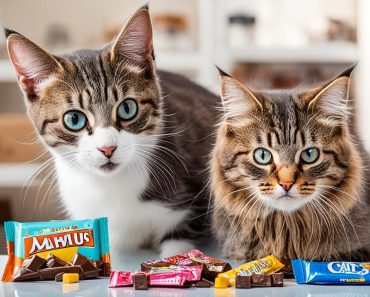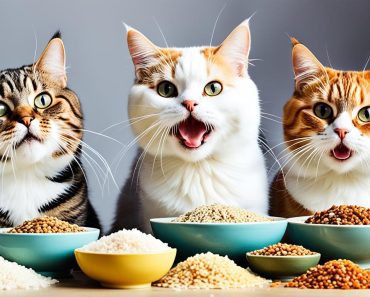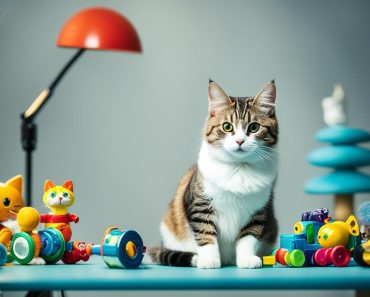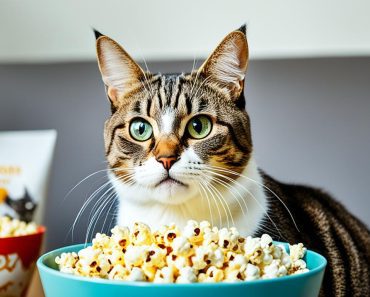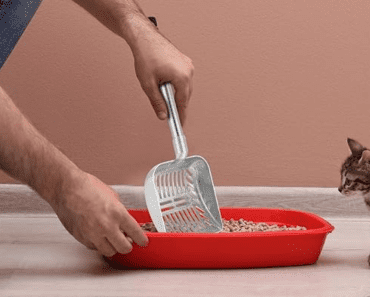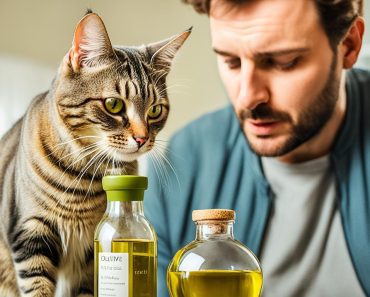As a responsible pet owner, it’s important to ensure that our feline friends are fed a balanced and nutritious diet. You may be curious about whether cats can enjoy dates, a delicious and sweet fruit that we humans love to indulge in. Let’s delve into the truth about feeding dates to cats and explore their potential health benefits and risks.
Can Cats Eat Dates? Yes, they can occasionally snack on it.
- Cats can eat dates in small amounts as an occasional treat.
- Dates are non-toxic and can provide dietary fiber and nutrients.
- However, due to their carnivorous nature, cats should not rely on dates as a regular part of their diet.
- Feeding cats large amounts of dates can disrupt their digestive system and cause stomach upset.
- Always monitor your cat when introducing dates and consult with a veterinarian for personalized guidance.
Are Dates Toxic to Cats?
When it comes to feeding our feline friends, it’s natural to wonder about the safety of certain foods. Cats are known for their selective eating habits, and as responsible pet owners, we want to ensure that we provide them with a diet that keeps them healthy and happy. If you’ve ever wondered whether dates are safe for cats, you’re not alone. Let’s explore the topic and unveil the truth behind dates and cat health.
Dates are not toxic to cats and can be included in their diet without worrying about adverse effects. These sweet fruits are non-toxic and contain several essential nutrients that can be beneficial for our feline companions. Dates are a good source of dietary fiber, which can aid in digestion and promote bowel regularity in cats. They also contain vitamins and minerals, including potassium, magnesium, and vitamin B6, which support overall health.
However, it’s important to keep in mind that while dates are safe for cats, they should be consumed in moderation. Feeding cats large quantities of dates can have a laxative effect and may lead to stomach upset or diarrhea. As obligate carnivores, cats have specific dietary needs that primarily consist of animal-based proteins. While fruits like dates can provide some nutritional value, they should not replace a balanced cat diet.
While dates are considered cat-friendly fruits, there are other fruits that should be avoided as they can be toxic to cats. Grapes and raisins, for example, can cause kidney failure in cats, and avocado can lead to vomiting and diarrhea. Additionally, citrus fruits, cherries, and persimmons can cause gastrointestinal upset in cats. It’s important to be cautious and avoid feeding cats any fruits that are known to be toxic or may cause digestive issues.
Dates are not toxic to cats and can be safely incorporated into their diet as an occasional treat. However, it’s crucial to feed them in moderation and monitor their response. Always consult with a veterinarian before introducing any new fruits or foods to your cat’s diet to ensure it aligns with their individual health needs. By being mindful of what we feed our feline companions, we can promote their well-being and keep them purring with joy.
What Happens if Cats Eat Dates?
Cats can safely eat dates in small amounts without negative effects. Dates can provide dietary fiber and vitamins, but it’s important not to overdo it. Feeding cats a large amount of dates can disrupt their digestive system and cause stomach upset.
Cats have a unique digestive system that is designed for a diet rich in animal protein. While dates can offer some nutritional benefits, they should not be a staple in a cat’s diet. Cats are obligate carnivores, which means they rely on animal protein as the main source of nutrition.
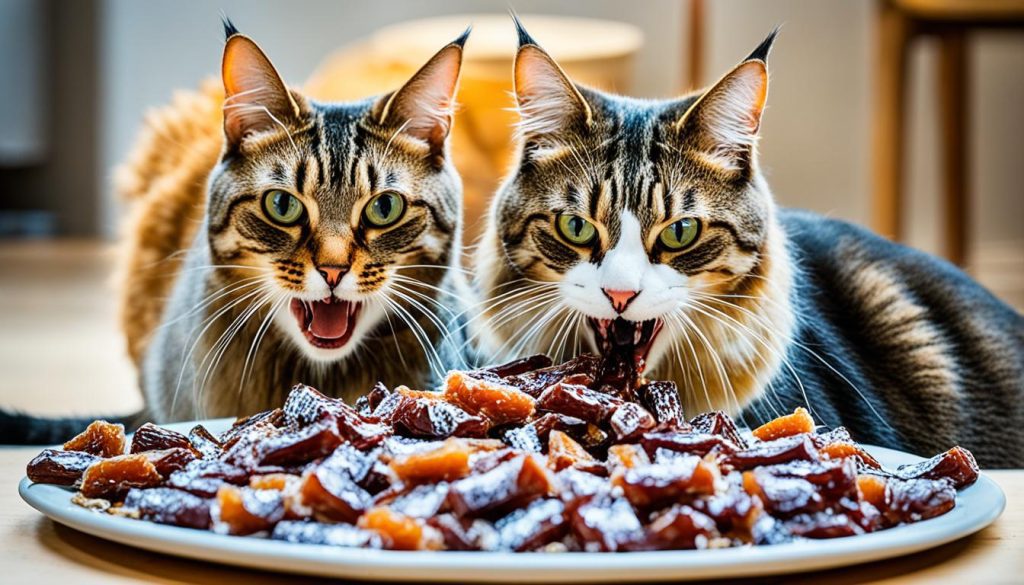
Some cats may have allergies or sensitivities to dates. It’s important to introduce dates gradually and monitor your cat’s reaction. If you notice any signs of an allergic reaction, such as itching, vomiting, or diarrhea, discontinue offering dates to your cat.
Occasional small amounts of dates as a snack should not have any negative effects on cats. However, it’s always best to consult with your veterinarian before introducing any new foods into your cat’s diet, including fruits like dates.
Remember, cats have specific dietary needs, and it’s essential to provide them with a balanced and appropriate diet to maintain their overall health and well-being.
Nutritional Value of Dates for Cats
Dates are a great source of nutrition for cats. They contain a variety of essential nutrients that can contribute to their overall health. Here is a breakdown of the nutritional value that dates provide:
- Vitamin A: Dates are rich in vitamin A, which supports healthy vision and immune function.
- B-complex vitamins: Dates contain B vitamins such as thiamine, riboflavin, and niacin, which are important for energy production and maintaining a healthy nervous system.
- Calcium: Dates are a good source of calcium, which is essential for strong bones and teeth.
- Iron: Dates contain iron, which is important for the production of red blood cells and oxygen transportation in the body.
- Magnesium: Dates provide magnesium, which plays a role in muscle functioning and maintaining normal blood pressure.
- Phosphorus: Dates contain phosphorus, which is necessary for bone formation and energy metabolism.
- Potassium: Dates are a rich source of potassium, which is essential for maintaining fluid balance, nerve function, and muscle contractions.
- Zinc: Dates contain zinc, which supports immune function and helps with wound healing.
In addition to these essential nutrients, dates are also high in dietary fiber, which aids in digestion and promotes bowel regularity for cats. They are naturally low in calories and fat, which makes them a healthy snack option for cats. The essential fatty acids found in dates contribute to maintaining a healthy skin and coat for cats.
Overall, dates can be a beneficial addition to a cat’s diet. However, it’s important to remember that they should be given in moderation and as part of a balanced diet. It’s always a good idea to consult with a veterinarian before introducing any new foods to your cat’s diet to ensure it meets their specific dietary needs.
How to Properly Prepare Dates for Your Cat
When it comes to feeding dates to your cat, it’s important to take the necessary steps to prepare them properly. By following these guidelines, you can ensure that your cat enjoys this cat-friendly fruit as a safe and tasty treat.
1. Removing the Pits
Fresh dates should always have the pits removed before giving them to your cat. The pits can be a choking hazard and should never be ingested. Take a moment to carefully remove the pits to ensure your cat’s safety.
2. Checking for Added Sugar or Preservatives
If you’re considering offering dried dates to your cat, it’s essential to check for added sugar or preservatives. Some dried fruits may contain unhealthy additives that can be harmful to your cat. Look for natural, unsweetened dried dates to ensure your cat is getting a healthy snack.
3. Breaking into Small Pieces
Before giving dates to your cat, it’s recommended to break them into small, cat-friendly pieces. This helps prevent choking and makes it easier for your cat to eat and digest the fruit. Remember, moderation is key when it comes to introducing dates into your cat’s diet.
4. Avoiding Date Syrup
While dates are a delicious and nutritious snack for cats, it’s best to avoid date syrup. Date syrup is often high in sugar and may contain unhealthy additives that can be harmful to your cat’s health. Stick to fresh or dried dates in their natural form for safe and nutritious cat treats.
By properly preparing dates for your cat, you can ensure that they can safely enjoy this cat-friendly fruit as a delicious snack. Remember to always introduce new foods gradually and monitor your cat’s reaction. With moderation and proper preparation, dates can be a tasty and safe addition to your cat’s diet.
What Fruits Can Cats Not Eat?
When it comes to feeding fruits to your furry feline friends, it’s important to be aware of the fruits that can be dangerous for their health. While some fruits are safe and even beneficial for cats, there are a few toxic fruits that cats should avoid at all costs.
Grapes and raisins should never be given to cats as they can cause kidney failure. Avocado is another fruit that should be kept away from cats, as it can lead to vomiting and diarrhea. Citrus fruits like oranges and lemons can cause an upset stomach and digestive issues in cats. Cherries, especially the pits and stems, contain cyanide which is toxic to cats. Lastly, persimmons can cause gastrointestinal upset in cats.
While some fruits like apples and pears are safe for cats in small amounts, it’s important to remove the seeds and cores as they contain cyanide, which can be harmful to your feline friend.
It’s always better to be safe than sorry when it comes to your cat’s health. If you’re unsure about a particular fruit, consult with your veterinarian to ensure that it is safe for your cat to consume.
Possible Side Effects of Eating Dates for Cats
The biggest concern when cats eat dates is the laxative effect they may have due to their high dietary fiber content. Dates can cause an upset stomach and diarrhea in cats if consumed in large amounts. While this is usually not a cause for concern, it’s important to monitor cats if they have eaten dates and take steps to reduce any negative impacts. Giving cats a few bites of dates as a treat should not result in any major side effects.
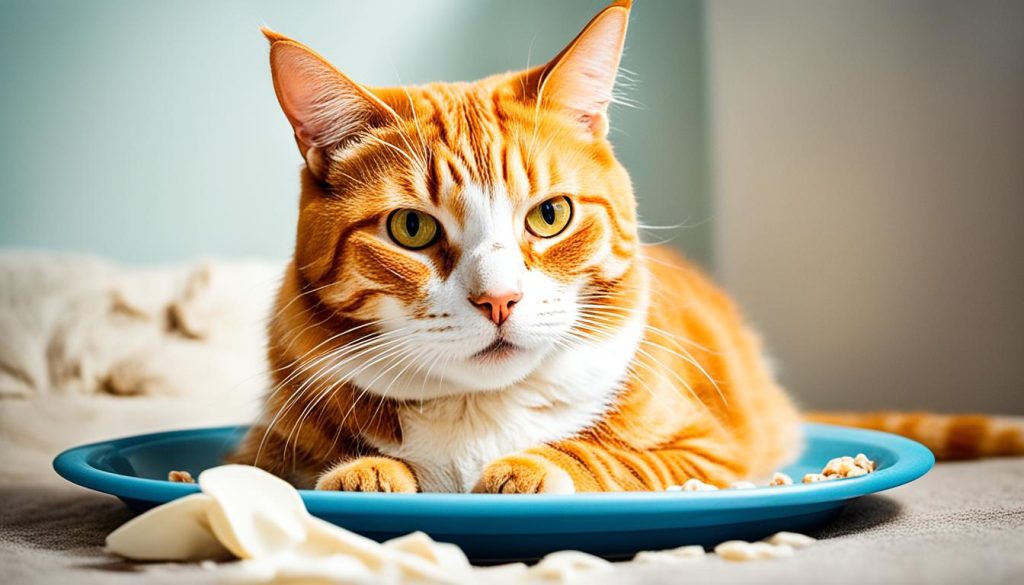
Feeding dates to cats can have side effects on their digestive system due to the high dietary fiber content. It is essential to monitor your cat’s reaction when they consume dates and take necessary precautions to avoid any discomfort or distress. Feeding cats dates in small amounts and as an occasional treat should not cause any major side effects, but it’s always best to consult with a veterinarian if you have any concerns.
Conclusion
Cats can safely enjoy dates as an occasional treat. While dates are not toxic, they should only be given to cats in small quantities and under supervision. Remember, cats are obligate carnivores, and their main diet should consist of protein-rich foods.
Feeding dates to your cat can provide them with some nutritional benefits, including dietary fiber and vitamins. However, it’s important to consider their individual dietary needs and consult with a veterinarian before introducing any new foods.
As responsible pet parents, we should prioritize the overall health and well-being of our feline friends. While cats can eat dates, it’s crucial to maintain a balanced diet that aligns with their natural carnivorous instincts. By understanding their nutritional requirements and providing appropriate care, we can ensure our cats live happy and healthy lives.

